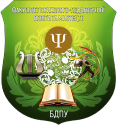About the Department of Primary Education
As an independent structural unit, the Department of Theory and Methods of Primary Education (now – the Department of Primary Education) was established in 1999. Prior to that, for nearly 40 years, methodologists trained future primary school teachers while working across various departments (Ukrainian Language, Mathematics, Natural Sciences, etc.). Professionals with high academic culture laid the key principles of educational, methodological, and scientific work, which continue to guide the department today.
In 2008, the department was headed by Doctor of Pedagogical Sciences, Professor, and Honored Educator of Ukraine, Liudmyla Koval – a devoted follower of the ideas and high standards of professional teacher education introduced by Academician Oleksandra Savchenko. Under her leadership, faculty members actively modernized educational curricula in line with current trends in primary education, implemented a competence-based approach and innovative technologies, and established active cooperation with other Ukrainian higher education institutions. This contributed to experience exchange, joint scientific projects, and improved the quality of future primary teachers' professional training. Particular attention was given to strengthening human resources: between 2015 and 2020, the department welcomed several young candidates of pedagogical sciences working on contemporary challenges in professional education. Since 2017, the department has organized and hosted the annual All-Ukrainian Scientific and Practical Conference "New Pedagogical Dimensions of Professional Development of Future Teachers: Modern Realities and Challenges," which has become a platform for discussing key aspects of teacher training by both theorists and practitioners.
From 2023 to 2025, the department was led by Candidate of Pedagogical Sciences, Associate Professor Lada Chemonina. This was an extremely challenging period, during which Berdiansk State Pedagogical University was temporarily relocated, and the educational process had to be organized using distance learning technologies. Despite all the difficulties, the department’s activities were effectively coordinated and adapted to new realities: modern forms of interaction with students, colleagues, and stakeholders were introduced (guest lectures, online workshops with practicing teachers, etc.); educational components were updated, and elective courses were developed; faculty underwent professional development, and students received didactic materials and technical resources through cooperation with The LEGO Foundation.
Since February 2025, the department has been headed by Candidate of Pedagogical Sciences, Associate Professor Maryna Nesterenko.
The department’s academic and methodological work is carried out in accordance with the high quality standards of Berdiansk State Pedagogical University. Faculty members apply innovative methods and forms of teaching and incorporate best European practices of educational process organization.
Working within the framework of the comprehensive research topic “Training Future Teachers in the Conditions of Primary Education Variability” (State Registration No. 0121U110223), the department’s academic staff actively participate in international, national, and regional scientific and practical conferences, and publish their research results in professional journals (category B), as well as in prestigious international journals indexed in Scopus and Web of Science. One significant achievement in this area has been the department’s involvement in the research project for young scientists “An Integrated Approach to the Professional Training of STEM-Oriented Teachers: Synergy of Knowledge-Intensive and Digital Technologies” (2024–2026, State Registration No. 0123U105357), led by Associate Professor Maryna Nesterenko and funded by the state budget.
The academic staff of the department consistently strive to provide high-quality educational services to students and help them realize their creative potential. The department’s activity, its strong intellectual potential, sense of responsibility and diligence – combined with optimism and goodwill – all contribute to the effective organization of an innovative and accessible process of preparing future primary school teachers.
